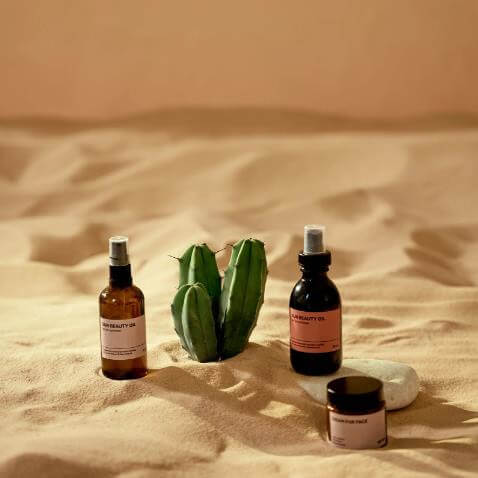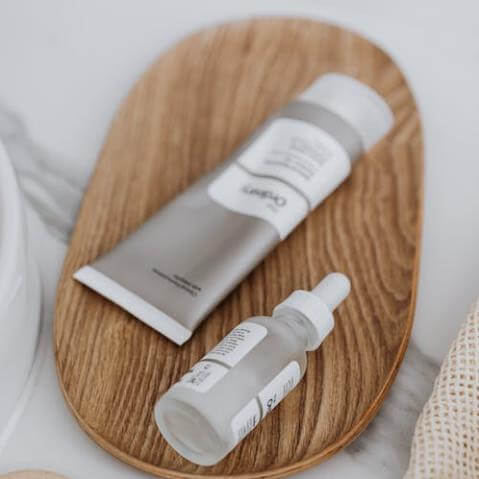No matter how dry, oily, or acne your skin may be, there are certain skincare ingredients you should not mix. Mixing skincare ingredients may deactivate each other, cause irritation, or even skin dryness. After exfoliating the skin with AHAs and BHAs, you may want to protect the skin from sun damage or slow skin aging with Vitamin C – don’t try!
Skincare ingredients you should not mix according to Dr. Davin Lim a certified board dermatologist are retinol and retinoids with ascorbic acid or benzoyl peroxide; salicylic acid with AHAs, retinol, or ascorbic acid, and hydroquinone with retinoids or ascorbic acids.
When fighting acne on your face or exfoliating the skin, mixing skincare ingredients strategically will enhance the product’s efficacy. A wrong match will leave the skin with a very unhappy feeling, irritated, and with unwanted side effects.
If you don’t have a skincare interaction checker and don’t know what skincare ingredients not to mix, here are the dos and don’ts from dermatologist Davin Lim.
What Are The Skincare Ingredients you should Not Mix?
1) Retinol and Retinoids With Ascorbic Acid

If you have skin irritation, you may want to use a gentler form of retinol like the original skin polymer tape or a hydroxypinacolone retinoate (HPR).
Skincare alpha hydroxy acids (AHAs) are best for improving skin texture, managing surface wrinkles, and smoothing fine lines. Some AHAs like glycolic acid have small molecules that penetrate your skin a little bit easier.
Do not mix retinol with ascorbic acid and other skincare acids which include Alpha hydroxy acids and beta hydroxy acids. L-Ascorbic acid also called Vitamin C and retinol operate best at different PH levels. Mixing retinol and ascorbic acid is a perfect recipe for redness, irritation, and peeling on your skin.
Ascorbic acid or vitamin C is water soluble while retinol- a derivative of vitamin A is oil soluble. These two skincare ingredients are insoluble and should not be mixed.
A key reason: If you mix retinol with ascorbic acid, retinol which is oil-soluble layers the skin creating a skin barrier, and thus blocking the absorption of ascorbic acid rendering it useless. Money and time are also lost
2) Retinol and Retinoids with AHA (Alpha hydroxy acid)

Image courtesy of Healthkart
Most of us look for skin care products with retinol, retinoids, or alpha hydroxy acid ingredient when searching for the most effective skin exfoliant. In a 2015
study
, it was confirmed that a combination of retinoic acid and glycolic acid is a good treatment for acne scars.
Skincare alpha hydroxy acids (AHAs) are best for improving skin texture, managing surface wrinkles, and smoothing fine lines. Some AHAs like glycolic acid have small molecules that penetrate your skin a little bit easier. Other examples of alpha hydroxy acids are malic, lactic, and citric acid.
Being excellent exfoliants, should you not mix retinol with AHAs?
Retinol is oil-soluble and is made of small molecules that penetrate deeper into the epidermis, while water-soluble AHAs work on the surface of the skin only. Many have found using retinol and AHAs together causes irritation. And if you combine them, they deactivate each other.
3) Salicylic Acid with Retinol

BHA’s is an oil-soluble skincare ingredient. Beta hydroxy acid is a powerful exfoliant and when you exfoliate your skin, it increases the potency of other care ingredients. This being not a steadfast rule, your dermatologist may recommend using a bit of beta hydroxy acid in the morning and a skin care product with retinol or a retinoid ingredient in the evening.
The Source
confirmed layering retinol with BHAs cause dryness, redness, irritation, flaking, and skin sensitivity. In the family of BHAs, you’ll find Salicylic acid. If you have to use salicylic acid and retinal, dermatologists recommend using the sequentially.
So far, we’ve covered skin care products with vitamin A ingredients like retinoids and retinoids, vitamin B ingredient which is compatible with most things due to their anti-inflammatory properties, and vitamin C.
There are lots of other active skincare ingredients you shouldn’t mix during your skincare routines.
4) Hydroquinone and Retinols

Example of a skincare product with hydroquinone
Hydroquinone or HQ hydroquinone is a common active skincare ingredient for treating skin pigmentation. Hydroquinone is a very potent inhibitor of an enzyme called tyrosinase and tyrosine.
These are enzymes responsible for making skin pigment. They make melanin granules or Melon packets and should not be mixed with retinol or vitamin C. However, there’s a product called Triluma which is a mixture of hydroquinone, hydrocortisone, or corticosteroid and retinoid.
If you’re going to mix hydroquinone with retinoid, there’s likely you’ll benefit from the anti-inflammatory. The inflammatory is therefore needed to counteract irritation caused by your hydroquinone and retinol.
When using skin care products with hydroquinone ingredients as a standalone, you should be cautious and the same applies to vitamin C. To remedy their side effects, your pharmacist may recommend compounding hydroquinone with a tiny bit of ascorbic acid in a concentration somewhere between 0.5-2% ascorbic acid.
The ascorbic acid in this case is not used as a pigment inhibitor but as an antioxidant to stabilize the hydroquinone.
Other skincare ingredients like botanicals whether it’s Burberry extract, licorice, or witch hazel, they can be mixed with most of the skincare ingredients like the vitamins A’s, B’s, and C’s and also your skincare acids. Basically, it’s because the irritant threshold of botanical extracts is very much lower compared to more active ingredients.
Conclusion
If you’re going to combine skincare products with active ingredients, do it cautiously. And if you’ve to combine skincare, start slowly, and then build up on your understanding of your skin threshold. Exceeding your skin threshold will demand you decrease inflammation.
To decrease, stop all uses of all active skincare ingredients, and use benign moisturizer as it locks in the skin moisture and prevents water evaporation. Once you’ve decreased inflammation, reintroduce your active skincare ingredients bit by bit.
Here’s what you should run away with from this brief guide;
1. Don’t mix retinol or retinoids with ascorbic acid because both are active ingredients and work aggressively at different PH levels. While retinol will work effectively in higher PH levels or alkaline, ascorbic acid or vitamin C thrives in acidic PH environments.
2. You shouldn’t mix retinol or retinoids (Vitamin A derivatives) with AHAs ( alpha hydroxy acids) like glycolic acid due to the high risk of skin irritation as both exfoliate the skin’s outer layer.

 By myulikeadmin
By myulikeadmin



